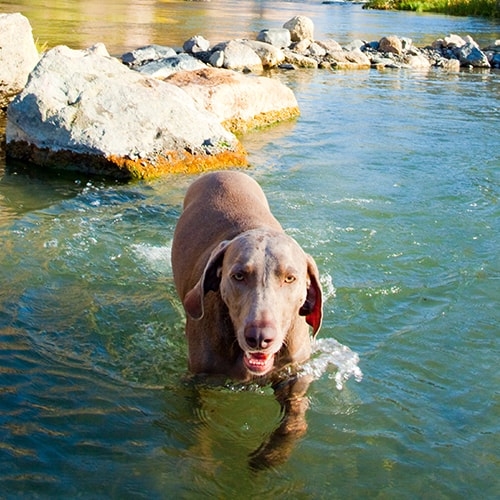| Size | Large |
|---|---|
| Average height | 56-69 cm |
| Average weight | 25-40 kg |
| Average lifespan | Over 10 years |
| Minimum exercise (per day) | 2 hours |
| Coat length | Short |
| Minimum cost (per month) | £105 |
Weimaraners are known for their beautifully striking looks and loyalty to their owners. They’re active and very intelligent dogs so can be easy to train with experienced owners. A large garden is an absolute must with Weimaraners!
Because they can be a little wilful at times, Weimaraners do best with owners familiar with the breed and their needs. They form very strong bonds with their family and are skilled hunters, so always keep a tight grip on their lead out and about.
Common health problems in Weimaraners
In the right hands, Weimaraners make wonderful family pets and can be very good natured dogs. Sadly, like so many purebred dogs, they are prone to certain health conditions relating to their breed.
If you are thinking of buying a Weimaraner puppy, make sure the parents of your puppy have had the relevant health screening to reduce the chances of your puppy being affected by certain conditions. We’d recommend looking for a Kennel Club Assured Breeder as they meet extra requirements which will benefit your puppy’s health.
Some of the conditions Weimaraners may develop include:
- Hip dysplasia – where the hip joint doesn’t fit together perfectly, which will eventually lead to arthritis. Before breeding, dogs should be screened by x-rays through the BVA/Kennel Club Hip Dysplasia Scheme.
- Certain cancers.
- Distichiasis – a condition in which small eyelashes grow on the inner surface or the very edge of the eye, which can then rub on the surface of the eye, causing irritation.
- Gastric Dilatation Volvulus (GDV) – where a dog’s stomach bloats and twists around on itself, which can be fatal.
If you want to minimise the risk of your dog getting problems, you can read our advice on choosing a pedigree dog.
Caring for your Weimaraner
Weimaraners are known to be loving and loyal dogs who thrive in active families. If you love long walks whatever the weather, then this is the breed for you! They have lots of energy and can be on the go for hours without stopping so are perfect for owners who love adventure.
They are devoted to their owners, so if you decide to adopt a Weimaraner you’ll often find they’re never far from your side. It can take them time to warm to new people, but once they do they are a friend for life.
Weimaraners and barking
While they aren’t known for being barkers, your Weimaraner is likely to make some noise and this will depend on their training and individual personality. If they are left alone for too long or bored, your Weimaraner may be a bit more vocal to let you know they are unhappy. If you’re having problems with excessive noise or barking, we recommend seeking the advice of an accredited behaviourist.
Training and socialisation
Because they can be strong willed at times, it’s really important to start positive, reward-based training as soon as possible with your Weimaraner. You need to set clear boundaries from day one as they’re known to try their luck – if you give an inch your Weimaraner is sure to take a mile! Consistency is key and everyone in your household needs to follow the same rules with training. Weimaraners are very intelligent but will pick up bad habits just as quickly as good, which is why they are better suited to experienced owners. If you’re a first-time owner or don’t have experience of the breed, we’d recommend taking your dog to accredited training classes.
Weimaraners can take a while to warm to new people (and dogs) so it’s really important to socialise them with a variety of people, dogs and experiences from a young age. They can sometimes be highly-strung, so this socialisation will really help them grow into relaxed and happy adults.
Weimaraners are known for being loyal dogs who form close bonds with their owners. For this reason and due to their exercise needs, it’s best to have someone with them all day. If left alone, Weimaraners can develop separation anxiety and may bark or chew anything they can get their paws on to let you know that they’re upset.
Exercise

Weimaraners have high exercise needs so fit in really well with active, outgoing owners. If you love walking and exploring, a Weimaraner is the perfect dog to do this with. They ideally need a home where they’ll have access to plenty of outdoor space so they can burn off their boundless energy.
Your Weimaraner will need a minimum of two hours exercise every day. This will need to include some long walks and plenty of opportunity to run and play off-lead in a secure area. Weimaraners don’t tire out easily, so it’s important to remember that two hours is the minimum they need! Agility and other activities can be perfect for Weimaraners so they can get rid of some of their excess energy while spending lots of time with you.
On top of this, your Weimaraner will need lots of playtime with you and training sessions. They pick up new things quickly so lots of puzzle games and things to challenge them are an absolute must to keep their brains active.
A lot of owners report how much their Weimaraner loves water and they are naturally very strong swimmers. Remember to make sure that if you take your Weimaraner for a swim it’s safe to do so and follow our top tips on water safety.
Grooming
Weimaraners are very low maintenance on the grooming front thanks to their short coats. A weekly brush should be plenty to keep on top of any dead hairs. They do shed all year round, but as long as you keep on top of the hoovering you won’t really notice it much. You may find a bit of extra brushing and hoovering around the home is needed in the spring and autumn when they’re likely to shed more.
Weimaraners and children
Weimaraners are fairly good around children as they enjoy playtime, although due to their larger size we wouldn’t recommend getting a Weimaraner if you have smaller children as they could accidentally knock them over. It’s really important to teach children how to treat your Weimaraner with respect to avoid any conflicts.
Remember to make sure you can recognise your dog’s body language so you can put a stop to any potentially stressful situations before they escalate. Always supervise your dog with children and vulnerable adults.
Weimaraners and other pets
Weimaraners tend to be a little cautious of unfamiliar dogs, so socialisation from a young age is really important. Even with this, you may find your Weimaraner prefers not to approach other dogs out and about and would rather stay with you and do their own thing.
Weimaraners were originally bred as gun dogs and are well known for their skills hunting. For this reason, we wouldn’t recommend having them with smaller pets. They have a very strong prey drive and are likely to chase anything that moves!
Food
Your Weimaraner’s diet will vary depending on their age. You’ll need to feed them a complete, balanced dog food to keep them slim and healthy.
Your vet will be able to tell you how much your Weimaraner should be eating. As a larger dog, you may find the food bill higher than if you had a smaller breed! You should feed them a good quality, commercially available, complete dog food. We usually recommend splitting their daily allowance into two meals. If you give your dog the occasional treat or use treats for training, remember to take this into account and reduce their daily allowance. Treats shouldn’t make up more than 10% of their daily calorie intake as this can unbalance their diet.
Try to feed your dog at similar times every day as they like routine. Remember to leave a gap between eating and exercising as this is thought to reduce the risk of GDV.
The cost of owning a Weimaraner

You can expect your Weimaraner to cost you a minimum of £105 per month after purchase and set-up costs and over £17,000 across their lifetime.
Costs you’ll need to think about include:
Purchase costs
Adopting an adult Weimaraner from a rescue centre may be a more cost-effective option, with the added advantage of giving a home to a pet without one – check if the rehoming centre you’re looking at asks for a donation for rehoming.
If instead you’re buying a Weimaraner puppy from a breeder, you’ll need to factor in this cost. Beware unusually cheap puppies as they could come from a puppy farm. If you’d like to buy a pedigree puppy, we recommend looking for a Kennel Club Assured breeder. These breeders must do extra health tests and meet higher standards.
Set-up costs
- Puppy vaccines – if you rescue a dog, reputable centres will often vaccinate them for you. Remember that ongoing booster vaccinations will be needed to continue their immunity.
- Neutering – you should usually arrange for your dog to be neutered at around 6-12 months old, although Weimaraners are known to mature quite slowly so your vet will be able to advise you exactly when is best. Check prices at your local practice as these will depend on your vet and where you live. Some rescue centres will neuter any dogs they rehome, saving you this cost.
- Equipment – including a collar and tags, lead, harness, dog beds, dog bowls, pet-safe toothpaste and toothbrushes, grooming brushes and toys. Keep in mind that all these will need to be replaced with wear or damage or if your dog outgrows or damages them!
Ongoing costs
- Food.
- Preventive healthcare – budget for routine vet visits to help stop your dog getting ill and catch any problems early. They need annual check-ups, vaccinations and regular flea and worming treatments. Check if your vet offers a health care plan as this can help spread the cost throughout the year.
- Vet bills* or pet insurance – if you don’t have pet insurance and your dog needs veterinary treatment for an injury or illness, costs can rapidly mount up. Check what’s covered and what isn’t when comparing policies.
- Accessories – including lots of poo bags, replacing worn toys and grooming accessories, buying doggy toothpaste and any other extras they might need.
Other costs
- Training – basic training is very important and dogs can benefit from formal classes. Some dogs may have, or develop, behavioural problems which might need professional management.
- Boarding – you may also need to budget for boarding or dog sitting costs if you are planning to go away from home on holiday.
- Dog walkers/day-care – you might consider a professional dog walker to keep your dog happy and healthy if you’re unable to get out with your dog enough yourself, or to look after them during the day if you need to be out for more than four hours.
* It’s always better to plan ahead and budget or get pet insurance in case your pet gets injured or unwell. If you are having difficulty with veterinary costs, you can check if you are eligible for treatment at PDSA here.
If you’re considering pet insurance, our PDSA Pet Insurance could be a great option for you and it’s quick and easy to get a quote online.
Fun facts
- Weimaraners have been nicknamed ‘grey ghosts’ thanks to their silver fur and pale eyes.
- They’re really strong swimmers and have webbed feet. Keep a tight grip on the lead out and about because your Weimaraner is likely to want to take a dip in any water they see!
- They were originally developed in Germany where the breed was kept secret until the 1930s!
- As they get older, their eyes can sometimes change colour from light blue to grey-blue or amber.
Getting a Weimaraner
Do plenty of research before getting a Weimaraner. They have very high exercise needs which makes them a higher maintenance breed, but if you can keep on top of this you’ll have the perfect partner for going on long adventures. They’re highly intelligent and very loyal dogs so in the right hands can be the perfect family pet.
Rehoming centres
There are plenty of rescue centres across the country where you may find a Weimaraner. Breed-specific rescues that specialise in Weimaraners are also out there. You’ll need to ask any rescue centre about the dog’s history to make sure they will be comfortable in your home. Good rescue centres should let you know of any health and behaviour problems.
Breeders
If you buy from a breeder, make sure your puppy will be well socialised and have all necessary screening tests, health checks and vaccinations. It’s really important that Weimaraner puppies from a breeder get the right early socialisation so always ask the breeder about how they go about this. We recommend looking for a Kennel Club Assured breeder as they meet higher standards. We’ve put together some advice to help you find a good breeder.









